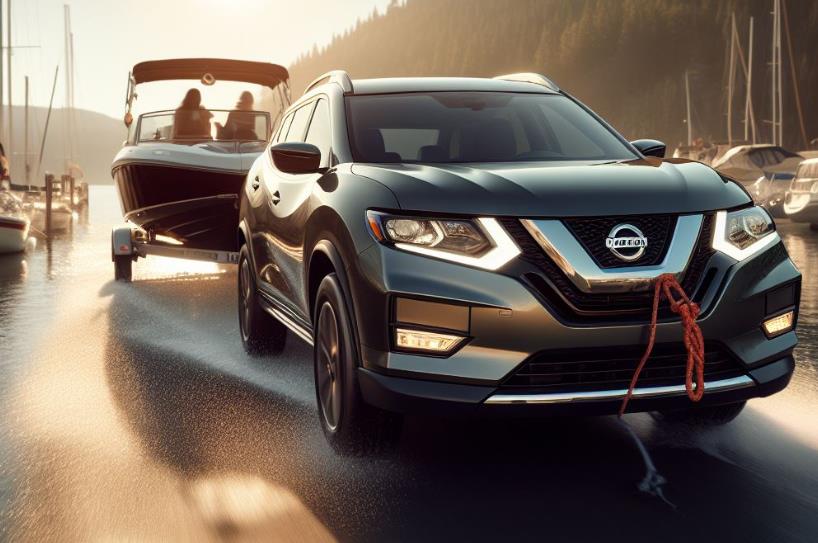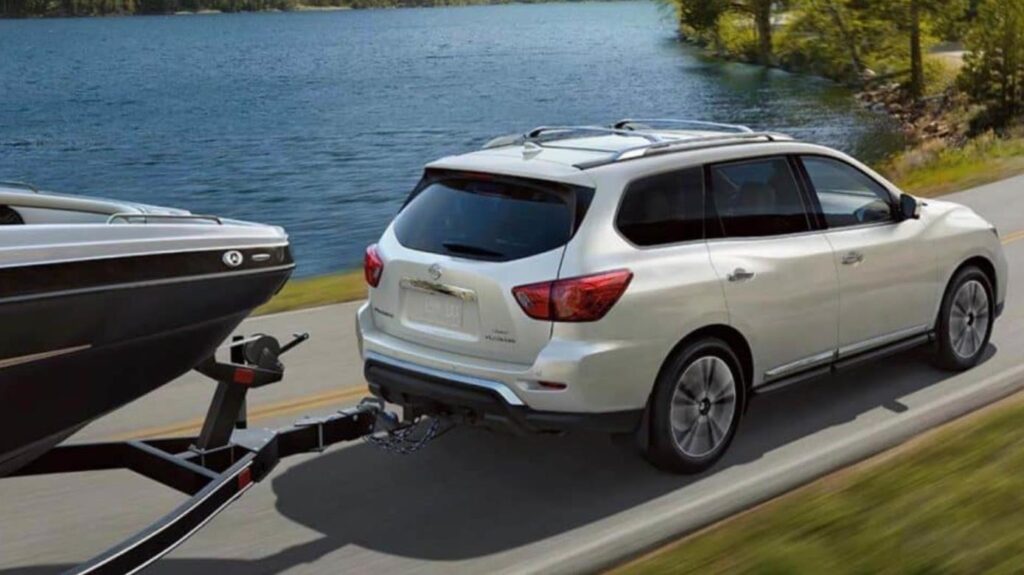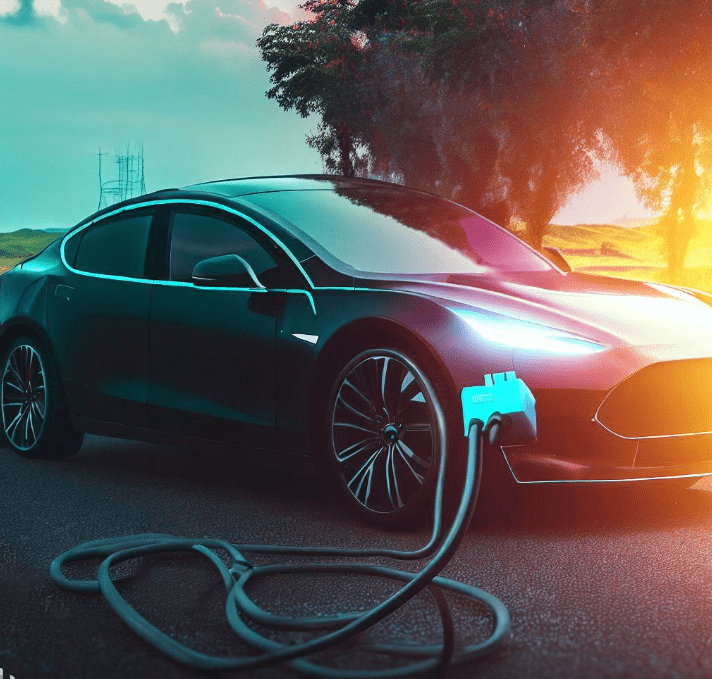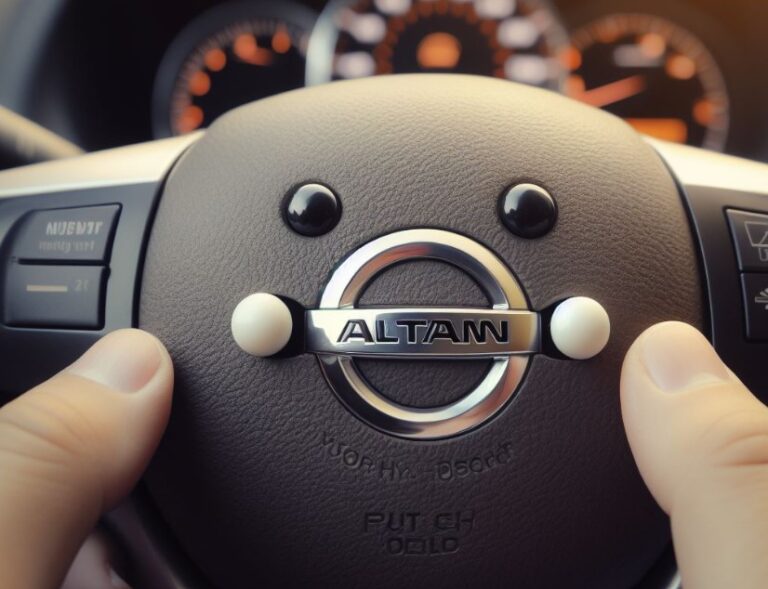Can A Nissan Rogue Tow A Boat? Factors Affecting Towing
If you’re an outdoor enthusiast, you’ve probably wondered, “Can A Nissan Rogue Tow A Boat?” This question is especially relevant if you’re considering buying a Nissan Rogue. In this comprehensive guide, we’ll delve into the towing capabilities of the Nissan Rogue and much more.
Key Takeaways
- The Nissan Rogue has a towing capacity of 1,500 pounds.
- Engine performance plays a crucial role in towing.
- Additional towing features enhance the Rogue’s capabilities.
- Consider the type of boat you want to tow.
Can A Nissan Rogue Tow A Boat?
Yes, the Nissan Rogue can tow a boat, but with some limitations. The 2023 Nissan Rogue has a towing capacity that maxes out at 1,500 pounds. This means it can handle smaller boats like kayaks or inflatable boats but may struggle with larger, heavier boats.

Engine Performance
The engine is the heart of any vehicle’s towing capabilities. The Nissan Rogue comes equipped with a 1.5-liter DOHC 12-valve Variable Compression Turbo (VC-Turbo®) 3-cylinder engine.
This engine produces 201 horsepower and 225 lb-ft of torque. The transmission is a Continuously Variable Valve Timing Control System (CVTCS), and it offers both FWD and Intelligent AWD options.
Fuel Economy
Fuel efficiency is another factor to consider. The Nissan Rogue offers a fuel economy of 30 MPG in the city and 37 MPG on the highway. This makes it a cost-effective option for towing smaller boats over short distances.
Types of Boats You Can Tow
Given the 1,500-pound towing capacity, you can tow:
- Kayaks
- Inflatable boats
- Small aluminum boats

When it comes to towing boats, the type of vehicle you have plays a crucial role. Generally, trucks and full-size SUVs are the go-to options for towing heavier boats like pontoons and cruising boats. However, many mid-sized SUVs can also tow up to 5,000 pounds, making them suitable for smaller boats.
The weight of boats can vary significantly, ranging from 300 to 5,000 pounds or more, excluding fuel and fishing gear. Therefore, it’s essential to match your vehicle’s towing capacity with the boat’s weight, including the trailer, which typically weighs between 600 to 1,500 pounds.
The type of boat you can tow also depends on the vehicle’s payload, which includes the weight the trailer places on the hitch and the weight it can carry inside, including passengers and cargo.
Larger radiators in vehicles can cool the engine more quickly, preventing overheating while towing heavier loads. So, whether you’re towing a small fishing boat or a larger pontoon, make sure your vehicle is up to the task.
Additional Towing Features
The Nissan Rogue isn’t just about raw power; it also offers advanced towing features. These include multiple drive modes like Sport Mode and Off-Road Mode. It also has Intelligent Trace Control, Active Ride Control, and Hill Start Assist, among others.
Safety Features
Safety is paramount when towing. The Nissan Rogue comes with an Automatic Brake Hold and Intelligent AWD to ensure a safe and smooth towing experience.
What to Consider Before Towing?
Before you hitch your boat to a Nissan Rogue, consider the following:
- Check the boat’s weight
- Ensure the trailer is in good condition
- Verify that you have all the necessary towing accessories

Before you hitch up that trailer or boat, there are several key factors to consider to ensure a safe and smooth towing experience. First and foremost, know your trailer.
Understanding the weight and dimensions of what you’re towing is crucial. The trailer often weighs more than the towing vehicle, and this extra weight can significantly impact your vehicle’s ability to stop quickly and navigate turns.
Another essential consideration is making wider turns at curves and corners. The trailer’s wheels will be closer to the inside of a turn than your vehicle’s wheels, increasing the risk of hitting or riding up over curbs.
Also, you’ll need to allow for longer stopping distances due to the added weight of the trailer. It’s advisable to drive in the right lane on highways, providing extra stopping room and making it easier to move to the shoulder in case of emergencies.
Additional tips include adjusting the trailer brakes according to the load, especially if your trailer has electric brakes. This adjustment can be made using an in-vehicle trailer brake controller system if your truck is equipped with one.
Don’t ride your truck’s brakes on long downhills; instead, shift to a lower gear to help slow the vehicle and relieve some strain off the brakes.
Always use a spotter when backing up, and practice driving with a trailer before hitting the road. Lastly, disconnect the trailer’s wiring from the tow vehicle before backing into the water at a boat launch to avoid electrical issues.
Factors Affecting Towing
Several factors come into play when towing a boat. These include the vehicle’s horsepower, torque, and the type of hitch being used. Make sure to consult your Rogue’s manual for the best practices.

Boat Weight Considerations
Understanding your boat’s weight is crucial. The boat, trailer, and any additional equipment should not exceed the Rogue’s towing capacity. Overloading can lead to severe safety risks.
Alternative Vehicles for Towing
If you find that your Nissan Rogue isn’t up to the task, consider alternative vehicles with higher towing capacities, like the Nissan Pathfinder or Ford Explorer.
Legal Requirements
Before hitting the road, familiarize yourself with the legal requirements for towing in your state. This includes maximum towing speeds and whether additional mirrors or lights are required.
Deep Dive into Towing with a Nissan Rogue

Towing Equipment Essentials
When it comes to towing a boat with your Nissan Rogue, the right equipment is non-negotiable. A Class I hitch is generally suitable for the Rogue, given its towing capacity. This type of hitch can handle up to 2,000 pounds, providing a safety margin for your towing endeavors.
In addition to the hitch, you’ll also need proper wiring for your trailer lights. This ensures that other drivers can see your signals when you’re turning or braking. A wiring harness that’s compatible with your Rogue’s electrical system is essential for this.
The Role of Transmission in Towing
The vehicle’s transmission plays a significant role in towing. Nissan Rogue comes with a Continuously Variable Transmission (CVT), which offers smooth transitions between gears. However, CVTs are generally not as robust as traditional automatic transmissions when it comes to towing.
If you’re planning frequent towing activities, it’s advisable to install a transmission cooler. This device helps to maintain optimal transmission fluid temperatures, thereby extending the lifespan of your CVT. Regular transmission checks are also recommended to ensure everything is in working order.
Fuel Efficiency While Towing
Towing a boat will naturally consume more fuel. On average, the Nissan Rogue offers around 26-33 miles per gallon (MPG). However, expect a 3-5 MPG drop when you’re towing.
To improve fuel efficiency, maintain a steady speed and avoid sudden accelerations or decelerations. Using cruise control can help maintain a consistent speed, but it’s advisable to turn it off in hilly terrains to avoid straining the engine.
Seasonal Towing Considerations
Weather conditions can significantly impact your towing experience. In summer, overheating is a concern, so ensure your Rogue’s cooling system is in top shape. In winter, snow and ice can make towing hazardous.
For winter towing, consider using snow chains on your tires for added traction. During rainy seasons, ensure your boat’s cover is secure to prevent water accumulation, which could exceed your towing capacity. Always adjust your driving style according to the weather conditions.
Emergency Procedures
Knowing what to do in case of an emergency is crucial. Always carry a basic toolkit, extra fuel, and emergency contact numbers. Make sure your phone is fully charged and that you have a map in case GPS fails.
In case of a breakdown, pull over to a safe spot and turn on your hazard lights. If you can’t fix the issue yourself, call for roadside assistance. Never attempt to repair your vehicle on a busy road, as it’s extremely dangerous.
What Can The 2023 Nissan Rogue Tow?
The 2023 Nissan Rogue comes with a towing capacity of up to 1,500 pounds. This makes it versatile enough to tow a variety of items. Whether it’s small boat trailers for motorboats, canoes, or kayaks, or even small utility trailers, the 2023 Nissan Rogue has got you covered.
It’s also capable of towing most teardrop campers, many pop-up campers, ATVs, snowmobiles, and even jet skis.

The vehicle is powered by a 1.5-liter three-cylinder engine that delivers 201 horsepower and 225 pound-feet of torque. This engine is available in both front- and all-wheel-drive configurations.
The 2023 Nissan Rogue offers both drivetrain options across all its trim levels, which include the Nissan Rogue S, Nissan Rogue SV, Nissan Rogue Midnight Edition, Nissan Rogue SL, and Nissan Rogue Platinum.
Each trim comes with the same standard engine and the same maximum towing capacity. However, additional options and features that add weight to the vehicle could potentially lower its overall towing capabilities.
Can A Nissan Rogue Tow A Jet Ski?
Absolutely, a Nissan Rogue can tow a jet ski with ease! Jet skis typically weigh around 850 pounds, well within the Rogue’s towing capacity of 1,102 to 1,500 pounds, depending on the model year.

The 2023 Nissan Rogue, for instance, has a towing capacity of up to 1,500 pounds. So, you can hitch up your jet ski and head to the lake without a second thought. Just make sure to install a tow hitch that can handle up to 250 lbs of tongue weight for optimal performance.
Is A Nissan Rogue Good For Towing?
Yes, the Nissan Rogue is a solid choice for towing light loads. The 2023 model comes with a 1.5L turbocharged 3-cylinder engine that produces 201 horsepower and 225 pound-feet of torque.

This engine is paired with a Continuously Variable Transmission (CVT) and is available in both front-wheel and all-wheel-drive configurations.
These features make the Rogue a reliable and efficient vehicle for towing small boats, jet skis, and utility trailers. However, it’s crucial to consult the vehicle’s manual for specific towing guidelines and limitations.
Conclusion
In summary, the Nissan Rogue can tow a boat, but it’s essential to consider the type and weight of the boat. With a towing capacity of 1,500 pounds and a range of additional features, the Nissan Rogue is a versatile option for light towing needs.
Equip yourself with the right knowledge and tools to make your boating adventure both fun and safe. Always adhere to legal requirements and prioritize regular vehicle checks to ensure a smooth towing experience.
Frequently Asked Questions
What Speed Should I Maintain While Towing?
When towing a boat with a Nissan Rogue, it’s advisable to maintain speeds between 30 and 40 mph. On single-carriageway roads and highways, lower the national speed limit of 60 mph to 50 mph. On freeways and multiple lanes, reduce the 70 mph limit to 60 mph.
What About Boat Trailers?
Boat trailers require special attention, especially if they get submerged in water during the boat’s launch or retrieval. This can affect the brakes and wheel bearing system. Always wash the trailer with fresh water after submersion and maintain proper tire pressure.
Is a Brake System Necessary for Boat Trailers?
For boat trailers weighing less than 750 kg, a brake system is not mandatory. However, the maximum allowable mass of an unbraked boat trailer should be less than half the curb weight of the towing vehicle to be legally towed.
What Should I Do in Case of an Emergency?
In case of an emergency, pull over to a safe spot and turn on your hazard lights. Carry a basic toolkit, extra fuel, and emergency contact numbers. If you can’t fix the issue yourself, call for roadside assistance.

Welcome to the exhilarating world of Matt Rex, a professional car racer turned renowned vehicle enthusiast. Immerse yourself in his captivating blog as he shares heart-pounding adventures, expert reviews, and valuable insights on cars, trucks, jets, and more. Fuel your passion for speed and discover the beauty of vehicles through Matt’s engaging stories and meticulous expertise. Join the ever-growing community of enthusiasts who find inspiration and expert advice in Matt Rex’s blog—a digital hub where the thrill of speed meets the pursuit of knowledge.





![Does Nissan Armada Require Premium Gas? [Answered]](https://www.turbochaos.com/wp-content/uploads/2023/11/Does-Nissan-Armada-Require-Premium-Gas.jpg)

